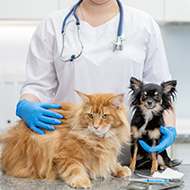Low cholesterol linked to mortality in cats and dogs, study suggests

"These findings suggest that low cholesterol levels are associated with mortality in canine and feline patients" - Steven Epstein.
Low levels of cholesterol are associated with mortality in canine and feline patients, according to new research.
The study published in the Journal of Small Animal Practice assessed the period prevalence of hypocholesterolaemia and the associated mortality rates in dogs and cats at the Veterinary Medical Teaching Hospital, University of California, Davis.
The team reviewed medical records of cats and dogs presenting to the hospital from September 2011 to August 2016 to identify animals that had at least one cholesterol measurement. They also collated patient signalment and clinical information, before calculating the period prevalence and mortality rate of hypocholesterolaemia.
The study revealed that the period prevalence of hypocholesterolaemia was 7 per cent in dogs and 4.7 per cent in cats. The mortality rate of hypocholesteraemic dogs and cats was 12 per cent in both species, which was significantly higher than that of animals with normal serum cholesterol.
Steven Epstein, corresponding author for the paper, said: “The odds of death in dogs and cats with hypocholesterolaemia were 3.2 and 2.5 times higher than in those with normocholesterolaemia respectively. Furthermore, there was a significant linear trend towards higher mortality in association with more severe hypocholesterolaemia in both species.
“Disease of the hepatic, gastrointestinal and lymphoreticular systems were most commonly associated with hypocholesterolaemia, and infectious and neoplastic disease were the most commonly associated pathophysiological processes in both species. In dogs with neoplasia, lymphoma was over-represented.”
JSAP editor Nicola Di Girolamo said: “These findings suggest that low cholesterol levels are associated with mortality in canine and feline patients. It is not clear whether hypocholesterolaemia is simply a marker for disease severity, or if it has active physiological effects contributing to poor outcomes. At this stage, it seems indicated to enhance intensity of diagnostic effort and therapy for affected animals.”



 The Veterinary Medicines Directorate (VMD) is inviting applications from veterinary students to attend a one-week extramural studies (EMS) placement in July 2026.
The Veterinary Medicines Directorate (VMD) is inviting applications from veterinary students to attend a one-week extramural studies (EMS) placement in July 2026.